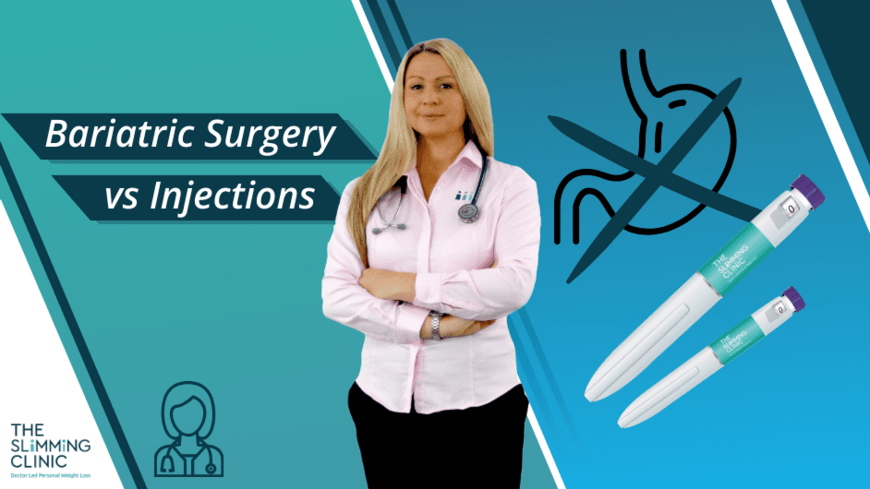Weight Loss Medication vs Surgery
Key Differences of Weight Loss Medication vs Surgery
For individuals struggling with obesity, weight loss is often more complex than just diet and exercise. Medical advancements offer both weight loss medications and surgical options to assist people in reaching their health goals. In this guide, we’ll explore the pros and cons of weight loss medication vs surgery, and address some frequently asked questions to help you make the most informed decision for your unique health needs and weight loss goals.
What’s the Difference Between Weight Loss Injections and Surgery?
Weight Loss Injections
Weight loss injections like Wegovy and Ozempic (both containing semaglutide), as well as Mounjaro (containing tirzepatide), are injectable treatments that work by suppressing appetite, slowing digestion, and stabilising blood sugar levels, helping you feel fuller with less food.
- Semaglutide works by mimicking the GLP-1 hormone, which helps regulate blood sugar, appetite, and digestion. This hormone is naturally produced by the body to signal fullness after eating.
- Tirzepatide, the active ingredient in Mounjaro, takes a more advanced approach by targeting both the GLP-1 and GIP hormones to enhance the effects on metabolism, appetite control, and fat burning. This dual-action makes it particularly effective in reducing appetite and promoting weight loss.
These medications are typically prescribed to individuals who have struggled to lose weight through traditional diet and exercise alone, particularly those who may not be candidates for bariatric surgery or who prefer a non-invasive approach.
Find out more about the different medications here: Mounjaro vs Ozempic, What is Mounjaro, What is Wegovy
Advantages of Injections:
- Less invasive: No surgery required, making them a good option for individuals who wish to avoid the risks and recovery time of surgery.
- Lower risk: Fewer complications and side effects compared to surgery.
- Adjustable dosing: Medication dosage can be tailored to individual needs, allowing for gradual adjustments in treatment.
- Reversible: If the patient stops taking the medication, the effects are generally reversible, unlike surgery, which is permanent.
Considerations of Injections:
- Long-term commitment: To maintain weight loss, injections need to be continued regularly.
- Side effects: Common side effects may include nausea, digestive issues, or potential risks associated with long-term use.
- Slower weight loss: While effective, weight loss may not be as rapid or significant as bariatric surgery.
Weight Loss Surgery
Weight loss surgery, also known as bariatric surgery, is a treatment for severe obesity that reduces the size of the stomach, helping individuals feel fuller with less food. There are several types of bariatric surgeries, each with different approaches:
- Gastric Bypass: The stomach is divided into two sections, creating a small pouch that bypasses part of the intestines, reducing calorie absorption.
- Gastric Banding: A band is placed around the upper part of the stomach to create a small pouch that limits food intake.
- Sleeve Gastrectomy: A large portion of the stomach is removed, leaving a smaller "sleeve" that limits food capacity.
- Gastric Balloon: A balloon is inserted into the stomach and inflated, reducing the space available for food.
Eligibility for NHS weight loss surgery typically requires a BMI of 40 or more, or a BMI of 35 with weight-related health conditions like type 2 diabetes, sleep apnea, or high blood pressure. Surgery is usually considered for individuals who have not had success with other weight loss methods. Patients must commit to lifestyle changes, diet adjustments, and regular follow-up check-ups. The surgery is performed in hospital, with a recovery time of 4 to 6 weeks, and patients typically go home 1 to 3 days after the procedure.
Advantages of Weight Loss Surgery:
- Significant weight loss: Surgery generally results in more rapid and dramatic weight loss compared to medications, especially in the first year.
- Long-lasting results: Once the surgery is performed, the changes to the stomach and digestive system are permanent, leading to sustained weight loss for most patients.
- Health improvements: Many patients experience significant improvements in obesity-related health conditions, such as diabetes, hypertension, and sleep apnea, after surgery.
Considerations of Weight Loss Surgery:
- Invasive procedure: Surgery involves general anesthesia and carries inherent surgical risks, including infection, blood clots, and bleeding.
- Recovery time: Recovery typically requires several weeks (4-6 weeks), during which patients must follow a strict post-operative diet and exercise plan.
- Lifestyle changes: Surgery requires a commitment to lifelong dietary and lifestyle changes. Failure to follow these changes can lead to complications like weight regain or nutritional deficiencies.
- Irreversible: Unlike medications, surgical procedures cannot be undone, so patients must be fully committed to the changes involved.
Bariatric Surgery vs Injections: What are the Differences in Results
Bariatric surgery and weight loss injections both offer effective results, but in different ways. Injections like semaglutide and tirzepatide provide significant weight loss with fewer risks, while bariatric surgery typically leads to more dramatic, long-term weight reduction and improvements in obesity-related health issues. Let’s compare the results of each option.
Weight Loss Injection Statistics
One of the latest studies on weight loss injections in the UK focuses on the drug semaglutide. According to a major global study involving University College London Hospitals (UCLH) and supported by the NIHR UCLH Biomedical Research Centre, semaglutide helped participants lose around 10% or more of their starting weight at an average of 15.3 kg (nearly 3 stone) and significantly reduced risk factors for heart disease and diabetes.
Tirzepatide at the 15 mg dose resulted in a sustained average weight loss of over 20% and was shown to reduce the risk of developing type 2 diabetes by an impressive 94% in adults with prediabetes, obesity and weight issues.
Bariatric Surgery Statistics
In the UK, bariatric surgery typically results in an average weight loss of around 50-70% of weight within the first two years following the procedure. According to the NHS, these surgeries, including gastric sleeve and gastric bypass, have shown significant improvements not only in weight reduction but also in obesity-related health conditions such as type 2 diabetes, hypertension, and sleep apnoea.
For the most recent data, the NHS National Obesity Audit provides detailed statistics on bariatric surgical procedures.
Bariatric Surgery vs. Injections: Which is the Better Choice?
Choosing between weight loss medications and bariatric surgery depends on various factors, including your health status, weight loss goals, and personal preferences. Here’s when you might consider each option:
When to Consider Weight Loss Injections:
- Gradual approach: If you prefer a less drastic, non-invasive method to manage your weight.
- Not eligible for surgery: If surgery is not an option due to medical reasons, such as other health conditions or your BMI not qualifying.
- Less commitment: If you’re not ready for a permanent lifestyle change or prefer a reversible treatment.
- Lower risks: If you want to avoid the risks associated with surgery but still need a medical intervention to help with weight loss.
- Flexible and adjustable: If you prefer a weight loss solution that can be adjusted over time and stopped if necessary.
When to Consider Bariatric Surgery:
- Severe obesity: If you have a BMI of 40 or more, or 35 with obesity-related health problems, and other weight loss methods have not been successful.
- Need for faster, more significant results: If you need a rapid reduction in weight to improve your health or to alleviate obesity-related conditions.
- Commitment to permanent change: If you are ready to make the necessary lifestyle adjustments and long-term dietary changes.
- Health conditions: If your obesity is significantly affecting your health, and surgery might provide the best chance for improving conditions like diabetes, sleep apnea, and joint pain.
What are my Options?
Both weight loss injections and bariatric surgery are effective treatments, but each has its own set of advantages and considerations. Injections offer a less invasive, adjustable approach with fewer risks but may require a long-term commitment. On the other hand, bariatric surgery provides more dramatic and lasting weight loss but carries greater risks and requires significant lifestyle changes. Ultimately, the right choice will depend on your individual health goals, preferences, and the support of your healthcare provider.
Whether opting for weight loss medication or surgery, it’s important to consult with a healthcare professional to fully understand the potential benefits, risks, and long-term impact on your health before making a decision. Why not book a weight loss consultation with one of our specialised weight loss doctors today to discuss your options?

Nutrition and Hydration Week: How Food & Hydration Aid Weight Loss

How Sleep Affects Weight Loss – World Sleep Day 2025

Winter Exercise: Our Top Winter Activities For Weight Loss

Healthy Frozen Meals For Weight Loss: Top Tips From Dr. Jane

Best Indoor Exercises for Weight Loss: Keep Moving & Active in Autumn...

Boosting Your Immune System Through Diet
Looking to start your weight loss journey, then take action today!
Book an appointment with one of our GMC-Registered Doctors who are weight loss experts and can ensure you get the best programme for you. Alternatively request your medication online using our online prescription service.


